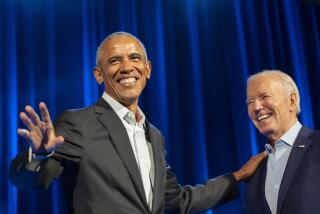GOP lags Democrats in campaign fundraising
- Share via
WASHINGTON — In 2002, when his approval rating was 76%, President Bush headlined a dinner for the Republican House and Senate campaign committees that raised about $30 million. Two months ago, he spoke at the annual affair, and with his positive rating having dropped precipitously, the take was a little more than $15 million.
Like the Republican presidential candidates, the party’s congressional effort is fighting a Democratic money tide this year, struggling with discontent over the war in Iraq, divisions over immigration policy and dissatisfaction in general with the Bush presidency.
In the first six months, the Democratic Senate Campaign Committee reported raising $31.2 million; its GOP counterpart garnered about half that -- $15.7 million.
On the House side of the ledger, the Democratic campaign committees reported raising about $36 million from Jan. 1 through June 30.
The comparable GOP group has not yet released a final figure, but it is expected to lag the Democrats. The gap, however, may not be as pronounced as it is for the Senate campaign committees.
Bush, as he has on more than a dozen occasions this year, did his part Monday night to gather funds for the congressional candidates the GOP will field in 2008.
He spent about an hour at a fundraiser in the Washington suburb of McLean, Va., for the National Republican Senatorial Committee.
The event was hosted by Dwight C. Schar, chief executive of NVR Inc., which owns Ryan Homes.
A committee spokeswoman, Rebecca Fisher, declined to say how much the event raised.
Republicans with experience in past campaigns express varying degrees of dismay about the party’s money problems.
A former White House aide who requested anonymity said, “There’s a strong political head wind all Republicans are going to face.”
The aide attributed it to a hangover from the party’s disastrous 2006 midterm election, when it lost majorities in the House and Senate.
This veteran Republican, who would not speak on the record when discussing the party’s difficulties, added, “A lot of our people are dispirited.”
Kenneth M. Duberstein, a White House chief of staff during President Reagan’s administration, who regularly donates money to the GOP, agreed with that assessment -- at least for the short term.
He said enthusiasm among Republicans “is being dragged down” by Iraq and the fight over rewriting immigration laws.
But he remains sanguine as he looks down the road, especially if Sen. Hillary Rodham Clinton (D-N.Y.) emerges as her party’s presidential nominee.
“Have no fear,” Duberstein said, “there’s nothing that unites the Republicans as much as the word ‘Clinton.’ This may be a summer of discontent, but this is only a temporary phenomenon.”
Still, events such as the one Bush attended Monday are the building blocks for funding a party’s national organization. And some Republicans are concerned by continued signs of the party’s struggle.
“I’m getting fewer invitations,” said Frank J. Donatelli, a GOP lawyer and political advisor. He added that when he did attend the events, he found them smaller than in the past.
For decades, Republicans could count on one particular financial advantage: Their leading presidential candidates would be better funded in the preliminary stages of the race than the major Democratic contenders.
But that fundraising pattern has reversed itself dramatically this year: Clinton and Sen. Barack Obama (D-Ill.) are easily outpacing the two top Republicans, former New York Mayor Rudolph W. Giuliani and former Massachusetts Gov. Mitt Romney.
One GOP campaign finance advisor, speaking on the condition of anonymity when commenting on his party’s money situation, said the “pretty tough climate” for Republicans in general was reflected by the fundraising totals in the presidential contest.
But this advisor expressed confidence that as the 2008 congressional campaign heats up, outside groups not affiliated with the party would help make up the difference.
“I will be kind of surprised when the votes are counted if anybody loses because of money,” he said. “The big races tend to get funded, and outside groups have supplanted the party committees” as a result of the 2002 law that overhauled campaign financing laws.
More to Read
Get the L.A. Times Politics newsletter
Deeply reported insights into legislation, politics and policy from Sacramento, Washington and beyond. In your inbox twice per week.
You may occasionally receive promotional content from the Los Angeles Times.









